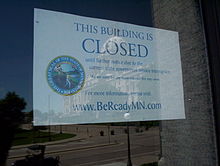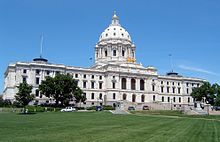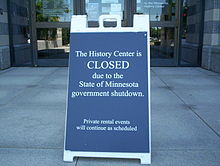- 2011 Minnesota state government shutdown
-
The 2011 Minnesota state government shutdown was a government shutdown affecting the U.S. state of Minnesota, due to a fiscal dispute between the Governor and the state legislature. The shutdown started at midnight, July 1, 2011. The eventual budget agreement started to form after Governor Mark Dayton announced on July 14 that he would "reluctantly" pass the last proposal of the Republican legislative leadership before the shutdown, but with conditions.[1] On July 20, 2011, the government shutdown ended.
Contents
Preceding events and issues
Going into the 2010 election, the state government was facing an approximately $5 billion budget shortfall in the coming 2011–2013 biennium, left over from the outgoing administration of Republican Governor Tim Pawlenty. The Republican Party claimed that the budget was based on a previous unrealistic projected increase in spending and pledged to balance the budget without raising taxes. Former Democratic–Farmer–Labor U.S. Senator Mark Dayton campaigned pledging to close the budget deficit by increasing income taxes on the state's highest earners. In the election, the Republicans won control of both houses of the legislature for the first time in decades while Dayton narrowly defeated Republican Tom Emmer.[2][3][4]
The legislature passed budget bills which balanced the budget with significant cuts to social and infrastructure services, rather than raising any taxes.[3] Governor Dayton vetoed 9 of the 10 budget bills after the regular legislative session had ended. Since Dayton did not call a special session of the legislature to further address the budget due to the lack of agreement between him and the Republican legislative leaders, Kurt Zellers and Amy Koch, limited legal authority existed to spend money after July 1, although a Ramsey County judge authorized a small portion of the spending. Because of this, major ("non-essential") portions of the state government were shut down as of midnight on June 30 – July 1, 2011.[5]
Minnesota's state government can not operate without appropriations under law, as mandated by the Minnesota Constitution. However, state courts have determined that Priority One and Two Critical Services must continue in the event of a shutdown.[6] These terms are used to describe the types of state contingency planning, with critical/core activities – those that must remain uninterrupted to avoid a potential immediate threat to public health or safety, are considered Priority One. This extensive list has been compiled and prepared by the Minnesota Management and Budget.[6]
The shutdown
The shutdown began on July 1. At that time, all less state urgent government spending and operations stopped. These included driving tests, child-care assistance, services for the deaf, senior and disability linkage lines, criminal background checks, and road construction. Many government offices, state parks, highway rest areas, the Minnesota Zoo, and sites run by the Minnesota Historical Society, among others, closed.[7] Institutions not part of the state government stayed open, and museums such as the Science Museum of Minnesota reported an increase in visits, as did county parks, and attractions in neighboring states.[8] On July 2, Ramsey County District Judge Kathleen Gearin ordered the reopening of the Minnesota Zoo, which it did on July 3. In a similar case the same day, Gearin stated Canterbury Park in Shakopee would remain closed.[9]
On July 4, Republican lawmakers affirmed their commitment to not agree to a budget of over $34 billion.[3]
Effects
There have been several effects from the state shutdown. Here is a partial list:
- MillerCoors lost their license to sell 39 brands of beer in Minnesota.[10]
- The Minnesota State Lottery did not operate during the shutdown, and no tickets were sold. In an average week in 2010, the lottery generated $2.3 million in revenue for the state.[11]
- Minnesota stopped selling tax stamps for cigarettes, which must be affixed to each pack before sale. The Star Tribune reported that cigarette sales would have to a halt by mid-August, unless more tax stamps were issued.[12]
- The state stopped issuing liquor purchasing cards, which businesses need in order to purchase liquor from wholesalers. Many stores, bars, and restaurants renewed their liquor purchasing cards before the shutdown. However, the purchasing cards for approximately 300 establishments expired on the first day of the shutdown, July 1. Liquor purchasing cards would have continued to expire on the first day of each month.[12]
- In an arson case at the former home of Governor Dayton near Lake Harriet, police were "investigating the possibility that someone [was] upset over last week's shutdown".[13]
- Services for state parks stopped. An official for the Minnesota Department of Natural Resources told the Pioneer Press that visitors were relieving themselves on the trails in Gooseberry Falls State Park, as the restrooms are closed, and that uncollected garbage has attracted bears in Crow Wing State Park.[14]
- Vandalism occurred at the Afton State Park where the main office was "ransacked" and a group of twelve "ripped off shingles and pieces of deck for firewood, burned additional furniture and wrote messages bragging about breaking in for free".[15]
Budget agreement
From the first day of the shutdown on July 1, until July 14, there were no announced talks between the two sides.[clarification needed][citation needed]
The government shutdown ended after Governor Dayton announced he would accept the last Republican offer before the shutdown, with certain conditions.[1][16][17]
The Republican offer relied on a shift in K-12 school aid payments from 70/30 to 60/40, and issuing tobacco bonds to cover the remaining gap. Other provisions included increasing the per student formula by $50 per year to cover additional borrowing costs, adding $10 million more to the University of Minnesota to equalize Minnesota State Colleges and Universities cuts, and restoring funding to the Department of Human Rights and Trade Office.[1] Documents released after June 30 stated that the Republican leadership included anti-abortion agenda, voting ID, and related issues during the budget negotiations.[18]
Dayton's conditions were that policy measures on matters such as abortion be dropped from the budget, 15 percent across the board reductions to state employees in all agencies be dropped,[19] and a $500 million infrastructure construction bonding bill.
On July 20, the legislature passed the budget bills, which were signed the same day by the governor.[16]
References
- ^ a b c Goldberg, Jeff; Keller, Bill; Lyden, Tom; Durkin, Mike (July 14, 2011). "Gov. Dayton Agrees to Republican Budget to End Minnesota Shutdown". MyFox Twin Cities. http://www.myfoxtwincities.com/dpp/news/politics/mn-shutdown-dayton-agrees-republican-budget-july-14-2011. Retrieved July 14, 2011.
- ^ Helgeson, Baird (July 28, 2011). "In Minnesota, budget fight fed the feud". Star Tribune. http://www.startribune.com/politics/statelocal/126367623.html. Retrieved August 11, 2011.
- ^ a b c Roper, Eric (July 4, 2011). "Time apart hasn’t lessened the rigid divide". Star Tribune. http://www.startribune.com/politics/statelocal/124988514.html. Retrieved July 5, 2011.
- ^ Post, Tim (November 3, 2010). "Republicans sweep into power in Minn. House, Senate". MPR News. Minnesota Public Radio. http://minnesota.publicradio.org/display/web/2010/11/03/republican-house-senate/.
- ^ Dayton, Mark (2011). "Gov. Mark Dayton's shutdown announcement". MinnPost. http://www.minnpost.com/infodoc/2011/07/01/29664/gov_mark_daytons_shutdown_announcement. Retrieved July 3, 2011.
- ^ a b "Contingency Planning Home". BeReadyMN. Minnesota Management and Budget. https://www.bereadymn.com/general-shutdown-faqs#nogo. Retrieved July 11, 2011.[dead link]
- ^ "What's open, what's closed: your guide to the state shutdown". Star Tribune. July 12, 2011. Archived from the original on October 18, 2011. http://www.webcitation.org/62XHBFDJN.
- ^ Levy, Paul; Jeff Strickler (July 3, 2011). "The state shuts down, but for some, business is up". Star Tribune. http://www.startribune.com/politics/statelocal/124924659.html. Retrieved July 3, 2011.
- ^ Von Sternberg, Bob (July 3, 2011). "Judge: Zoo can open, but no horse races". Star Tribune. http://www.startribune.com/politics/statelocal/124919189.html. Retrieved July 3, 2011.
- ^ McNaney, Bob (July 12, 2011). "Shutdown Puts Beer Sales on Ice in Minnesota". KSTC-TV, Channel 45. http://kstc45.com/article/stories/S2195924.shtml?cat=11512. Retrieved July 13, 2011.
- ^ Dunbar, Elizabeth. "List of the potential costs of a shutdown". MPR News. Minnesota Public Radio. http://minnesota.publicradio.org/display/web/2011/06/27/shutdown-costs/. Retrieved July 11, 2011.
- ^ a b Roper, Eric (July 12, 2011). "One by one, bars get tapped out". Star Tribune. http://www.startribune.com/politics/statelocal/125459928.html. Retrieved July 12, 2011.
- ^ McKinney, Matt (July 6, 2011). "3 fires set at former Dayton home in south Minneapolis". Star Tribune. http://www.startribune.com/local/minneapolis/125051829.html. Retrieved July 6, 2011.
- ^ Orrick, Dave (July 6, 2011). "With restrooms closed by shutdown, problems pile up at Minnesota state parks". The Pioneer Press. http://www.twincities.com/news/ci_18465821. Retrieved July 6, 2011.
- ^ Beno, Leah (July 6, 2011). "Afton State Park Vandalized During Shutdown". MyFox Twin Cities. http://www.myfoxtwincities.com/dpp/news/minnesota/afton-state-park-vandalism-shutdown-july-6-2011. Retrieved July 6, 2011.
- ^ a b "Minnesota's Government Shutdown Comes To An End". NPR. July 20, 2011. http://www.npr.org/2011/07/20/138540704/minnesotas-government-shutdown-comes-to-an-end. Retrieved July 29, 2011.[dead link]
- ^ Davey, Monica (July 14, 2011). "Deal Is Made for Ending Shutdown in Minnesota". The New York Times. http://www.nytimes.com/2011/07/15/us/15minnesota.html.
- ^ "Leaked Republican negotiating position". 2011. http://www.scribd.com/doc/59110623/Compromise-Offer-to-Governor-Dayton-from-Minnesota-Legislature-20110630232030082. Retrieved July 6, 2011.
- ^ Helgeson, Baird (July 14, 2011). "Dayton, GOP leaders have reached a deal to end government shutdown". Star Tribune. http://www.startribune.com/politics/blogs/125567238.html.
Categories:- Government of Minnesota
- State budgets of the United States
Wikimedia Foundation. 2010.




